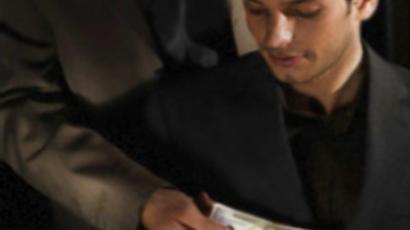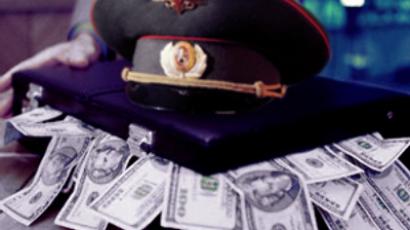Witch hunt or justice?
Bribery is rampant in Russia’s universities, with students habitually greasing the palms of professors to secure college places or good exam results. The government says it’s had enough and is promising a crackdown.
Russia's Interior Ministry has confirmed that bribery is a common practice in third-level education in Russia.
It says students can pay between $500 and $2,000 to “buy” a college place.
And others will hand over large amounts of cash to pass exams and get a good final degree result.
University student Evgeny Malinovsky says he bribed his way through one exam on a history diploma course – but says he doesn't consider it immoral, because everyone's at it.
“I don’t feel guilty at all. It’s totally normal now; there’s nothing awkward about it. The phenomenon of bribing has become engrained so strongly in Russia’s education system that it doesn’t shock anyone. Everybody knows about it, and everybody does it,” Evgeny says.
But now the government is cracking down on corruption, bringing criminal proceedings against bribing professors.
“During our anti-corruption operation we uncovered over 3,500 cases of corruption within universities. Bribes had been paid to get a place in an institution or faculty, or to pass final exams. It's clear that, instead of studying, students prefer to solve their problems by bribing their teachers,” says Vladimir Konovalov from Russia’s Interior Ministry.
Even Moscow State University, the most famous one in Russia, is no stranger to bribery.
One of its former professors, Nina Sorokina, says low salaries force many teachers to accept bribes for extra cash.
“This university is extremely popular; students pay to pass entrance exams, and professors are tempted to profit from this situation,” Sorokina says.
An average salary in Russia’s universities is estimated to be about $450 a month.
At Moscow's Higher School of Economics, Professor Mark Levin has been investigating corruption. He estimates $1 billion is paid in bribes each year.
He says this corruption-riddled system is producing unqualified doctors and lawyers.
“The consequences for society are awful. Doctors could potentially buy their diploma and go on to perform an operation on you or me! Nowadays any student knows they can get an education without studying hard, without gaining knowledge. This surely is demoralising the younger generation,” Levin says.
Education experts warn that merely prosecuting professors won’t help stamp out corruption. As long as bribery benefits both parties, it will continue to thrive.
Critics claim Russia's education system is ripe for reform. What's needed, they say, is a stronger enforcement of ethnical standards in academia.
At times, however, the rush for fake documents resembles a witch hunt.
Recently, Rostov-on-Don police received information that ‘The best teacher of the year 2007’ landed her job at a school with a falsified diploma.
“Currently, we are considering whether to press criminal charges against the Russian language and literature teacher or not,” a police source was quoted as saying by RIA Novosti news agency.
Her family told the agency that the woman “has done a lot” for the school and the children,
“but now nobody cares,” said her family member. “There is the law and that is it.”
Some media reports suggested that the woman had fallen victim to jealousy, leading to her falsifying documents.














